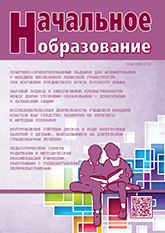The article presents an analysis of the criteria and levels of formation of cognitive needs of younger schoolchildren. The components of cognitive needs are considered, which include: the perfect representation of younger schoolchildren on the image of the pupil; cognitive value; cognitive installation; cognitive interests. The ideal representation of younger schoolchildren on the image of the student is considered as incentives and controls of their cognitive activity. Educational values as awareness of the value of knowledge, manifested in the understanding by the younger children the importance of teaching for themselves and for the society. Cognitive attitude is defined as the willingness of younger schoolchildren to educational activity, due to the behavior and the manifestation of their personal qualities (responsibility, hard work, discipline, cognitive activity, persistence). Cognitive interest is understood as the existence of a positive relation of younger schoolchildren to the doctrine. The author characterizes the levels of formation of cognitive needs of younger schoolchildren.
cognitive needs of younger schoolchildren, ideals, cognitive interests, cognitive attitude, cognitive values.
Смена приоритетов в системе образования, ориентация на формирование творческой личности приводит к интенсивному поиску наиболее эффективных форм образовательной деятельности, способствующих раскрытию максимальных возможностей личности к познанию, объяснению окружающего мира и его явлений.
В современных условиях рост научного знания, его постепенное превращение в производительную силу общества делает профессионально необходимым наличие у специалистов прежде всего таких качеств, как стремление к постоянному пополнению знаний и их творческому применению в профессиональной деятельности. Они должны формироваться в период обучения в школе, так как именно тогда происходит становление человека как личности. В связи с этим возрастает необходимость разработки возможных путей формирования у учащихся познавательных потребностей, служащих основой адаптации к социально-экономическим условиям и являющихся базой для подготовки к последующей профессиональной деятельности.
1. Aseev V.G. Lichnost’ i znachenie pobuzhdeniy [Personality and value motives]. Moscow, Mysl‘ Publ., 1993. 223 p.
2. Babanskiy Yu.K. Optimizatsiya protsessa obucheniya [Optimizing the learning process]. Moscow, Pedagogika Publ., 1977. 187 p.
3. Zagvyazinskiy V.I., Atakhanov R.A. Metodologiya i metody psikhologo-pedagogicheskogo issledovaniya [Methodology and methods of psychological and pedagogical research]. Moscow, Akademiya Publ., 2001. 208 p. EDN: https://elibrary.ru/RXJCXP
4. Platonova T.A. Eksperimental’noe issledovanie protsessa porozhdeniya poznavatel’noy motivatsii. Kand. Diss. [Experimental study of the generation of cognitive motivation. Cand. Diss.]. Moscow, 1980. 23 p.
5. Mikadze Yu.V. Psikhologicheskiy slovar’ [Psychological Dictionary]. Moscow, Pedagogika Publ., 1983. 448 p.
6. Mizherikov V.A. Psikhologo-pedagogicheskiy slovar’ [Psychological and Pedagogical Dictionary]. Rostovon-Don, Feniks Publ., 1998. 544 p.
7. Serikov V.V. Lichnostnyy podkhod v obrazovanii: kontseptsii i tekhnologii [Personal approach to education: concepts and technology]. Volgograd, 1994. 115 p.






